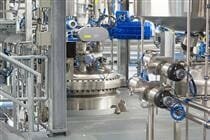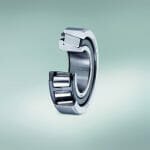Creating a new hygienic production facility that includes ATEX zone 1 areas is a complex task, especially when the facility will need over 1,400 control valves. Hygienic process systems specialist Briggs of Burton PLC called in Bürkert to help deliver a large-scale manufacturing facility for a Life Sciences company Purolite.
Briggs of Burton was appointed by Purolite as the main contractor to design and build additional production facilities consisting of eleven reactor vessels split across nine production areas. Briggs was able to specify the manufacturer of the equipment being installed, (except for the sensors, the supplier for which had already been decided) and chose Bürkert products.
Specialist requirements
The scale of the project meant that the equipment would be located in a range of environments from outdoors to ATEX zone 1. Any valves, sensors or control gear located in potentially explosive atmospheres must be manufactured and certified as well as being installed by suitably qualified engineers.
Having been appraised of the process requirements, Briggs needed process equipment suppliers that could deliver not just the valves but also the 3D CAD drawings and relevant certification to integrate into their overall 3D model. The drawings are essential for the design engineers to finalise the valve locations and ensure that all the equipment will fit into the space available around the vessels.
Briggs initially approached Bürkert for diaphragm valves, but during the discussions about the project, it became apparent that Bürkert would be able to deliver all the process valves they needed. This would include, butterfly, quarter turn, diaphragm and manual valves.
Improved efficiency
In total, the project needed over 1,400 process valves and each one had to be accompanied by certification documents and drawings. The delivery of this information was greatly simplified when Bürkert setup an online resource for Briggs engineers to login and access all the information they required.
The logistics of the project were also further simplified when Bürkert packaged together all the valves for each production area and labelled them accordingly. This made the installation process much quicker and ensured that all the necessary valves were in the correct location.
Aside from the standard process valves, Bürkert was also able to create bespoke solutions for tank bottom valves; multi-seat valve blocks were also manufactured to minimise the footprint of the installation. Bürkert’s specialist manufacturing capabilities ensured that every part was delivered with the correct control gear and seals for a simple installation.
Damien Moran, Field Segment Manager Hygienic, Pharmaceutical for Bürkert, explains: “Our aim is to deliver the best solution for the customer and our products are designed so that they fit into local, decentralised or, as in this case, centralised control structures. With some additional advice, we were able keep the project costs to a minimum, while ensuring reliability.”
Reducing costs
All the automated valves for this project have pilot solenoid valves in the control head, or in the case of the quarter turn valves, located in the switch box on the top of the controller. This made a number of external valve islands and the associated ATEX rated pneumatic control panels redundant, saving the project around £80,000.
George Crombie, Engineering Director for Briggs, comments: “The whole process has been much simpler than we envisaged, and Bürkert’s ability to make changes to individual valves quickly, plus their ability to manufacture bespoke valve manifolds has really helped in the delivery of this project.”
Duncan Sinclair, Production Manager at Purolite, concludes: “The new production facility has worked out very well. The knowledge of the Bürkert engineers in hygienic process control has certainly paid off in the final design. The partnership between Briggs and Bürkert has delivered an efficient and cost-effective project.”
About the plant:
Purolite Life Sciences’ facility is capable of producing 100,000L of high flow agarose resin annually for their Praesto® range of Protein A affinity and ion-exchange resins, designed for the purification of monoclonal antibodies.
The multi-million-pound investment gave Purolite Life Sciences capability to supply 30% of global demand for agarose-based chromatographic resins, with construction boosting local supply chains in South Wales by an estimated £120 million. The state-of-the-art manufacturing facility, located at Purolite’s R&D Centre of Excellence in South Wales, was officially opened in 2018.
Read more here: www.purolite.com/sercurity-of-supply
Tour the Facility www.youtube.com/Purolite Life Sciences





